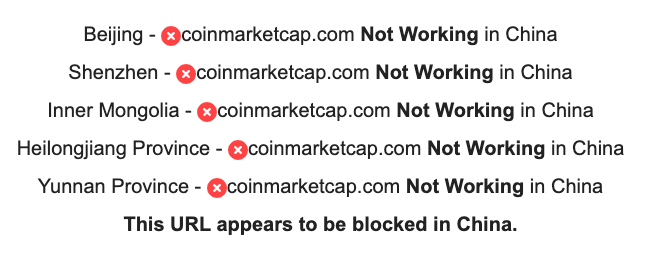
- China's internet firewall has blocked access to crypto data sites CoinMarketCap and CoinGecko.
- Websites that don't comply with government regulations have been blocked under the Great Firewall of China in the past.
- Cryptocurrencies are seen as a threat to China's model of centralized control and its efforts for a digital yuan.
- Sign up here for our daily newsletter, 10 Things Before the Opening Bell.
People in mainland China don't have access to two popular crypto data aggregators, as the country's censorship regime has apparently blocked their websites, according to tests run on its internet firewall system.
Real-team data providers CoinGecko and CoinMarketCap were blocked by the country's firewall on Tuesday, as per results seen on test tools China Firewall Test and Comparitech. It isn't clear when users lost access to these domains, but people reportedly began to notice they were inaccessible early Tuesday in China.
The incident was first reported by crypto news outlet The Block.

A test for another popular page, CoinDesk, showed the site was not blocked.
TM Lee, CoinGecko's co-founder, told The Block that the site didn't shut off access on its own. This indicates that Chinese authorities, or the Great Firewall of China, seem to be behind the move, after Beijing's recent declaration that all crypto-related transactions are illegal.
Meanwhile, crypto analytics platform Bybt has restricted access from within mainland China of its own accord.
Non-compliance with Chinese regulation in censoring information has already led to more than a million sites being blocked. Facebook, Google, and Instagram are among other popular pages that cannot be accessed in China.
This latest move suggests China aims to root out crypto enthusiasts influenced by the community's belief that cryptocurrencies will surpass money as the dominant form of finance around the world.
A ban on any related websites is part of its effort to push its own digital yuan as a global reserve currency. Cryptocurrencies are seen as a threat to both that effort and China's model of centralized control.
Users in mainland China can still use a workaround to enter blocked sites through access to a Virtual Private Network.